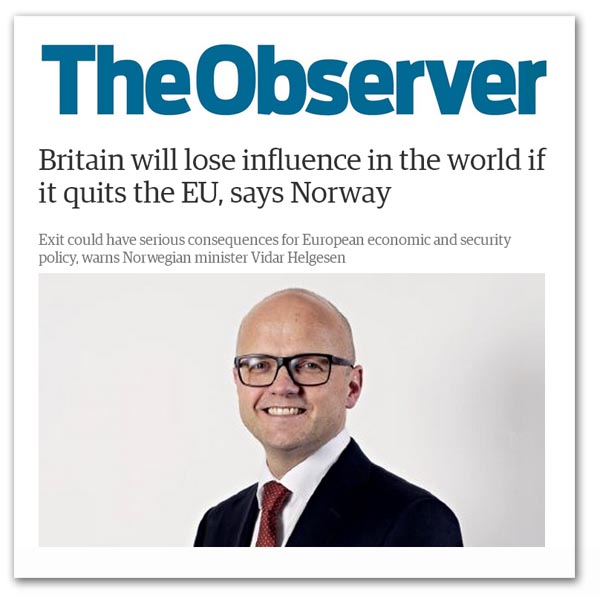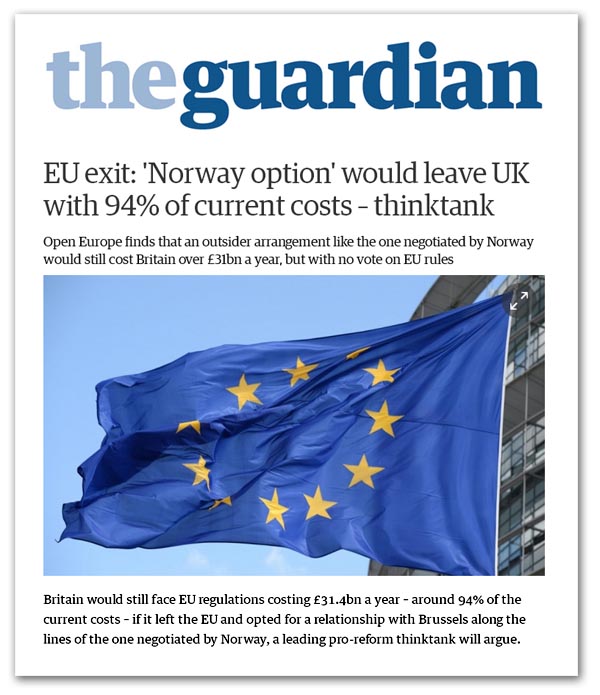He has been given a platform by the Observer , taking the opportunity also to tell us that his country has often found it difficult to shape economic rules that affected Norway – often cited by Eurosceptics as a shining example of how a nation can thrive outside the EU – while not being a member.
This is a sideways dig at the "Norway Model", but it must say something for this option that the Europhile tendency that it is so keen to discourage its adoption, taking virtually every opportunity to spread the message of how bad they think it is.
Not content with the usual frighteners, though, Helgesen adds a reference to a time of "burning security crisis not seen since the cold war". Most key meetings, he claims, are now being convened at EU level, rather than within Nato, and it was vital that the UK was there to shape decisions.
The man is on his way to talk to the pro-EU campaigning group, British Influence, with a speech entitled: "The European Union: why one who has not joined thinks that WE should not leave".
Largely as a result of its oil resources, Norway is one of the wealthiest countries in Europe, with a higher per-capita income than the vast majority of its member states.
As a result, we are told, "British Eurosceptics" often say the Norwegian experience is evidence of how a country outside the EU, but enjoying the benefits of the single market through membership of the EEA, can prosper without having to commit itself to full membership.
This, however, is classic straw-man territory. But then, the only way the Europhiles can win an argument is to distort it first, beyond all recognition.
In Flexcit, we recognise that the Norway Modelis an imperfect instrument, advocating it only as a halfway house – a ready-made template to ease our way out of the European Union. This is but stage one of a three-part process, with the benefits of withdrawal accruing mainly in the third stage.
Such is the narrowness of his vision, though, that Helgesen complains EEA membership often creating "frustrations and difficulties", which means that "Norwegian ministers and officials spent a lot of time – sometimes without success – trying to find out what was going on in EU meetings that would affect their country directly".
"We [Norway] are fully integrated into the EU single market as members of the EEA", he says, "but what we don't have is the right to vote on those regulations that are incorporated into our law when they are made by the council of ministers".
But with qualified majority voting applying to the Council of Ministers, and Britain holding 29 out of the 352 votes, it can cast only eight percent of the vote. Yet, a qualified majority is 252 votes - 73.9 percent.
In the European Parliament, the situation is little better. There are 73 UK MEPs, and these represent a mere 9.7 percent of the 751 elected MEPs. Given the party splits, this level of representation is notional. UK MEPs rarely vote together as a single bloc. Even if they did, they could never muster the 376 votes needed for a majority.
Thus, the idea that Norway is gravely disadvantaged by not having a vote is sheer fantasy. Any relationship with the EU – in or out – is going to be fraught.
It is, therefore, of little consequence that Helgesen reports that, on occasion, Brussels has sprung surprises that the Norwegians could not predict. The same kind of frustrations, he says, could well face the UK – as if they do not already, and continuously so.
Here, what is so fascinating about these Europhiles is how little they know of the construct they so adore – much less of the way the world works, and the Norwegian part in it.
Referring to our membership of the Union, he says: "You would not have all those Brits staffing the commission where the decisions are made", then adding: "Britain being on the outside would obviously not have that amount of people on the inside. You would find it more difficult, as a result, to affect the regulations".
That, of course, is not how regulations are affected, and this is not even how the game is played – as the Norwegians themselves well know, with their role in Codex standing as a major example of how regulation is framed.
It takes Anne Tvinnereim, former Norwegian State Secretary – whom we interviewed when we went to Norway – to present the honest position. "We do get to influence the position", she told us. "Most of the politics is done long before it [a new law] gets to the voting stage".
Nevertheless, Helgesen says: "It is up to the British to make the decision [as to whether they leave the EU], but I would not think that if the Norwegian model were applied, that this would be ideal". This, though, is nothing more than a statement of the obvious. There is no such thing as an "ideal" in practical politics – only sensible compromises that take us towards a desired goal.
And clearly, such rationality is beyond Peter Wilding, British Influence's director, to whom Helgesen is coming to talk. "Eurosceptics who peddle the myth that Norway is the best [model] for a non-EU Britain are deceiving the British public", Wilding says. "They say leaving leads to more democracy and security. This is nonsense".
So yet again a Europhile resorts to the straw man argument. Nowhere in Flexcit and nowhere generally do we see it argued that the Norway Model, per se leads either to more democracy or security. That is not the point. It is merely a means to an end.
Before we leave it there, however, we have to observe that the other side of the Norwegian divide is suffering from the same misconceptions.
This we see with Heming Olaussen, former director of the Norwegian "No Campaign", who – as the recent Bannerman fest - also warns us against the EEA option (as do most of the other participants).
When, however, these people have the depth of knowledge that we have acquired, though dint of solid hard work, they might be worth listening to. As it stands, it is remarkable how so many can stand up to parade their ignorance, and still believe they have anything to offer.
What tells us more than anything, though – far more than their words – is the frequency and intensity with which so many parties seek to condemn the "Norway Model", alongside their determination to ignore Flexcit. This tells us that we are on the right track. It wouldn't scare them so much if we weren't.

